In room consumables that reduce your environmental impact
BATHROOM
Faith in Nature shower gel, hand soaps and more we wash your towels with faith in nature laundry detergents
Faith in Nature is a B Corp which means they verified to meet very high standards of social and environmental performance, transparency, and accountability. In a nutshell it means they are a businesses doing good for people and the planet, in addition to making a profit.
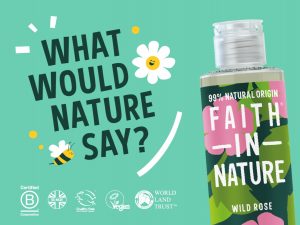
Their products are made in the UK using 100% natural origin aroma and the highest quality cruelty-free ingredients, their products harness the power of Nature without harming it in the process.
Their products are approved by the Vegan Society and the Cruelty Free International Leaping Bunny programme, the internationally recognisable gold standard for cruelty free products.
Plastic packaging and microplastics in soaps
You have noticed the plastic soap bottles have a funny grey tinge. This is because they are made from 100% recycled plastic.
As well as packaging plastics can also be found in cosmetics. On average a human being absorbs up to five grams of plastic per week, which is roughly the weight of a credit card.
Faith in Nature state on the company website: “We’ve never used micro-beads in our face washes or other products.” They also don’t use any microplastics or non-biodegradable liquid polymers in their products
In 2018, the UK government banned the use of microbeads in toothpastes, shower gels and facial scrubs. However, some products classified as “leave on” were not subject to the ban, this would include lotions, sun cream and makeup, as well as abrasive cleaning products. This ban did not extend to non-biodegradable liquid polymers. Like microplastics, these materials degrade with a similar difficulty in the environment and may cause similar harm.
To check your cosmetic products for microplastics please download the app at https://www.beatthemicrobead.org/
Chemicals in Faith and Nature products
Faith in Nature places a strong emphasis on utilizing natural and non-toxic ingredients in their product formulations, offering numerous benefits to both consumers and the environment. They consciously steer clear of the chemicals commonly found in cosmetics, such as parabens, Triclosan, SLS (sodium lauryl sulfate), artificial colors, and synthetic fragrances.
To better comprehend the significance of this commitment, let’s delve into the properties of these chemicals:
Parabens are preservatives used to thwart bacterial growth. However, parabens can mimic the hormone estrogen in the body and disrupt the normal hormonal balance and potentially affecting male and female reproductive system functioning and increase the risk of cancer (they have been linked to breast cancer).
Triclosan, serves as an antibacterial agent and is classified as a pesticide. . It can interfere with the body’s hormone systems, particularly thyroid hormones, which regulate metabolism and may disrupt normal breast development. Additionally, the EU categorizes Triclosan as skin and eye irritant, deeming it highly toxic to aquatic organisms.
SLS (Sodium Lauryl Sulfate): A common foaming agent in many soap products, SLS is primarily derived from petroleum. This chemical has the adverse effect of stripping the skin of its natural protective barriers, upsetting its oil and moisture balance. Moreover, SLS can readily permeate the body and accumulate in internal organs, potentially leading to long-term health issues. Individuals with conditions like eczema, psoriasis, or sensitive skin are advised to avoid products containing SLS, as contact may result in redness, dryness, scaliness, itching, or soreness.
To delve deeper into the subject of chemicals in cosmetics, consider exploring the article on the topic by Ethical Consumer, titled “Toxic chemicals in toiletries and beauty products” at the following link: Ethical Consumer – Toxic chemicals in toiletries and beauty products | Ethical Consumer
Certified sustainable Palm Oil
The unsustainable production of palm oil is one of the biggest threats to the forests and wildlife of areas where it’s grown like Borneo and Sumatra. Huge areas of rainforest have been cleared to make way for oil palm trees, destroying the habitats of a wide range of animals and plants including orangutans, other threatened primates and many endemic bird species.

RSPO certified palm oil protects the environment as well as local communities who depend on it for their livelihoods, so that palm oil can continue to play a key role in food security, economic development and supply chains.
I’m pleased to say that Faith in Nature products don’t incorporate palm oil as a direct ingredient in any of their products. While certain ingredients they utilize may contain palm oil derivatives, it’s important to note that these derivatives come from a certified sustainable origin.
To find out more about what products you use contain Palm Oil please download the PalmOil Scan App – What you can do from the Chester Zoo website.
Toilet Paper
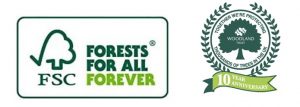
We use Nikki Elite Toilet paper in our bathrooms. Nikki have worked in partnership with the Woodland Trust and have helped plant 250,000 trees and protect 1,200 woods in the UK.
Nicky Elite toilet tissue is produced from Forest Stewardship Council certified raw materials obtained from responsibly managed forests and controlled sources.
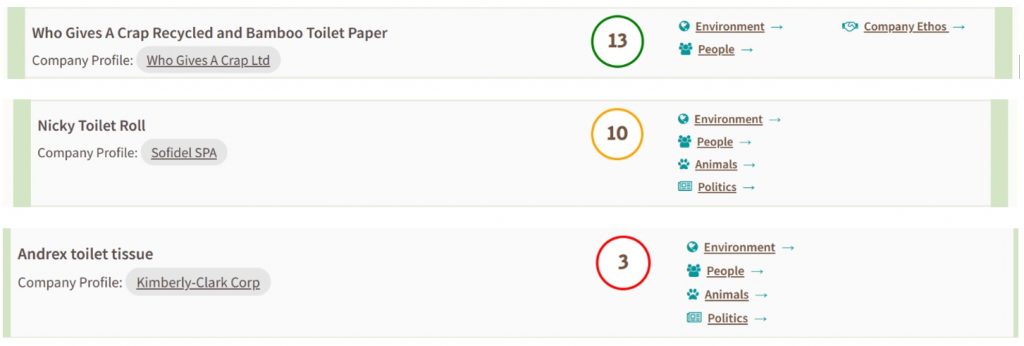
Ethical Consumer Magazine has bestowed Nikki Toilet Roll with a commendable sustainability score of 10 out of 20, trailing only three points behind the highly esteemed Who Gives a Crap branded paper. This score significantly surpasses Andrex’s score of 3.
BEDROOM
Hospitality Tray
Coffee
In response to the collapse in coffee prices falling below farmers’ production costs. Cafédirect was established in 1991 with Oxfam being one of the four founder members. Its aim was to trade directly to ‘give coffee bean, cocoa and tea growers a larger slice of the purchase price for the products’.
Cafédirect only buy direct from the smallholder farmers through long term agreements with repeat purchases, reducing farmers risk and offering them security. They agree on the coffee price with the farmer cooperatives directly, rather than through an importer and always pay social and environmental premiums on top of the market price for coffee which are spent on reforestation, organic transition, health or housing, and it is always invested in improving coffee quality.
Cafédirect, the UK’s inaugural B Corp certified coffee company, offers Fairtrade and Organic certified products. Their freeze-dried instant coffee preserves the original flavor, enhancing its superior quality.
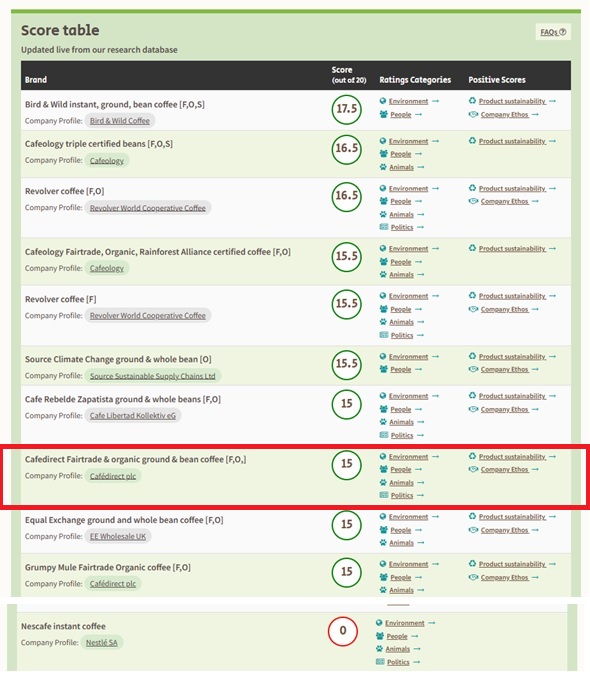
Cafedirect is an ethical consumer magazine best buy with an impressive score of 15/20 which is a vast improvement on the Nescafe sticks that we previously used that have an ethical consumer score of 0/20. Its the highest rated coffee available that’s packaged in sticks suitable for use on hospitality trays.
Tea
We’ve chosen Clipper as our teabag supplier, and they specialize in providing tea bags that are plant-based, biodegradable, unbleached and non-GM. This commitment ensures that your cup of tea is free from polypropylene, contributing to a reduction in plastic waste in the environment.fully Additionally all there packaging is recyclable including the envelope the tea bag is provided in. Clipper is also B Corp certified company supplying us with fair trade and organic certified tea.
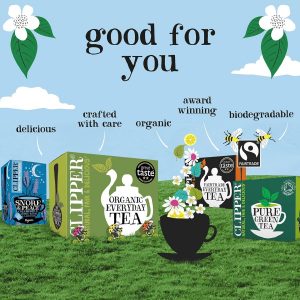
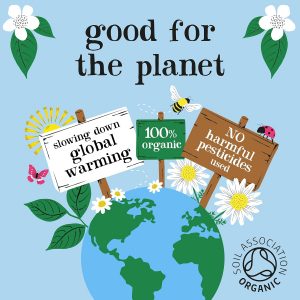
Over the past decade they have offset more than 31,000 tonnes of carbon emissions. To put it in perspective, this is equivalent to eliminating 347,017 car trips from London to Paris!
Biscuits
Boarder Biscuits
Boarders Biscuits ensures that all its palm ingredients, including derivatives, bear the certification of the Roundtable on Sustainable Palm Oil (RSPO). Additionally, they proudly non-GMO verified product. Their dedication to sustainability encompasses their packaging, which is entirely recyclable, even the packaging utilized for the twin packs you’ll discover in our guest rooms.
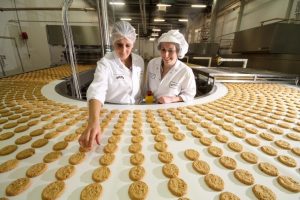
Furthermore, Boarders Biscuits demonstrates a strong commitment to Corporate Social Responsibility. Their company goals include striving to be a great place to work. They actively cultivate a positive working environment and invest in the training and development of their employees. Notably, they introduced a profit share scheme in 2018, which allocates 10% of their profits to their hardworking staff. This initiative reflects their dedication to making their employees feel valued and appreciated.
Larissa’s Home-Made cupcakes
Larissa’s Home-made cupcakes are made with care using locally sourced ingredients. Our cupcakes contain flour from Nelstrops Mill in Stockport made using wheat sourced in Cheshire and that come delivered in 100% recyclable packaging thats made from Forest Stweadrship Council certified paper.
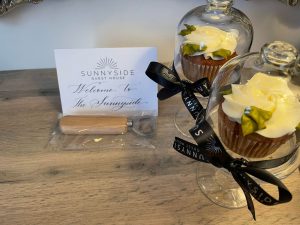
Eggs from Lang Farm Gate Eggs in Ormskirk. To sweeten the deal, we use Fairtrade Vanilla Extract, Fairtrade sugar, and Fairtrade Icing Sugar, ensuring ethical and delicious treats for our guests. Occasionally, we even incorporate on-site churned butter, adding an extra touch of homemade goodness to our cupcakes.
If we have any spare cakes left over we send them to Southport Soup Kitchen who distribute them amongst the needy.
Reusable glass bottles
To reaffirm our unwavering commitment to reducing single-use plastic, we’ve taken proactive steps at Sunnyside Guest House. We’ve replaced plastic water bottles with reusable glass ones, filled with water that we filter on-site.
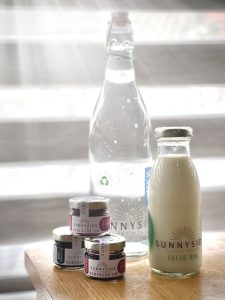
Additionally, we proudly provide locally sourced milk from our local dairy, obtained from the region’s farms and served in reusable glass bottles. These efforts have been instrumental in us achieving the prestigious Surfers Against Sewage Plastic Free Gold Award, reflecting our dedication to a sustainable and environmentally responsible approach.
Compostable Bin Bags
The conventional production of bin liners can harm the environment significantly. Typically, these standard bin liners are crafted from petroleum-based plastics, essentially extracting oil that has formed over millions of years to manufacture plastics that may take anywhere from 15 to 1000 years to decompose fully.
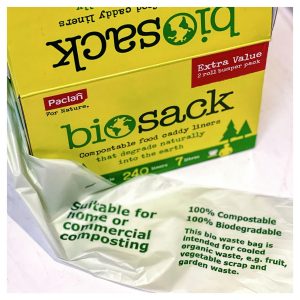
In contrast, our compostable bags are crafted from 100% plant-based materials. These compostable bags originate from renewable resources, ensuring a more sustainable and eco-friendly choice.
